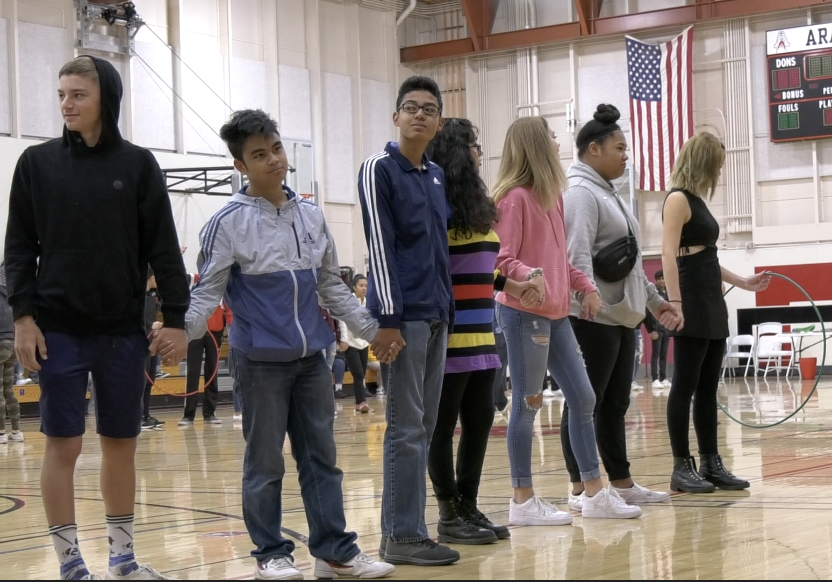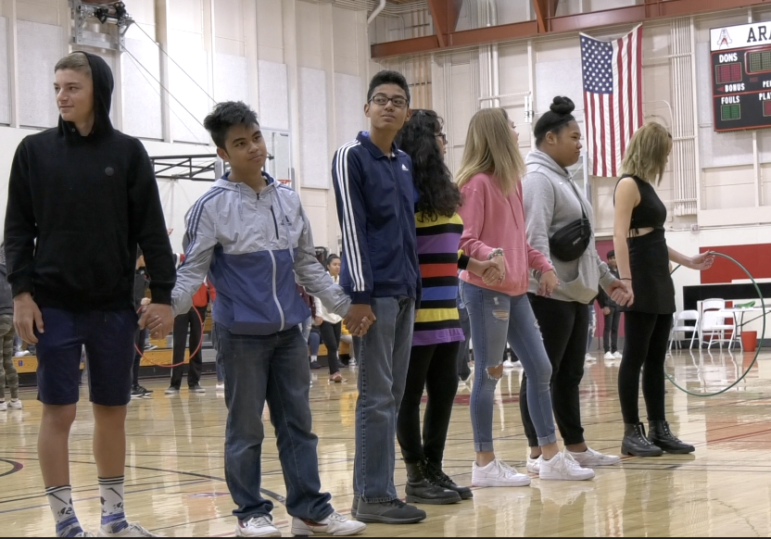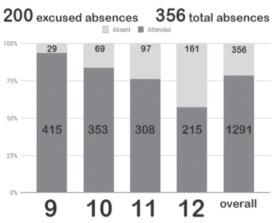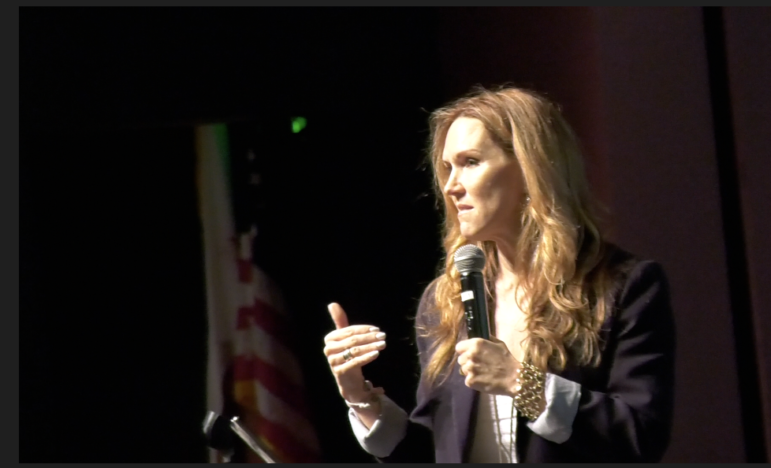
Students played bonding games and listened to a presentation on consent.

Three wellness assemblies were held at Aragon’s Wellness Day on Nov. 27. The assemblies were titled “Clean the Air” and “Supporting a Friend in Distress,” “Culture of Consent” and “Dons United: Team Building” discussed drug use, distress, sexual misconduct and community building respectively.
Students were divided into three sections by their birthdays. Throughout the day, the groups rotated between the three assemblies.
“The district is having every school have the consent assembly,” said Assistant Principal Lisa Nagendran. “Some schools are doing it where they just have that assembly, and then they’re running
other things or classes. We decided to capitalize on the opportunity and bring in some other speaker and do some other activities.”
The “Clean the Air” assembly was a result of recent trends and student opinion.
“I believe that there’s been a big uptake in vaping use and Juuls across the district,” said Wellness Coordinator Joanne Michels. “I believe that a student [from Aragon] requested for more information … We collected data from the Healthy Kids Survey and other students who were interested in learning about more topics and vaping [and] helping a friend in distress came up.”
According to the attendance records, 1291 out of 1647 students were present on Nov. 27, the day of the assembly—78 percent of total attendance. By grade level, 93 percent of freshman, 84 percent of sophomores, 76 percent of juniors and 57 of percent seniors attended. Comparatively, the total school attendance on Nov. 26 and Nov. 30 respectively was at 95 percent and at 94 percent.

The data shows the approximate attendance because the administration experienced technical difficulties when scanning students in. The internet shut down, and the fast rate of scanning caused some present students to be marked absent.
“Sometimes students scanned in physically, but it didn’t enter digitally on the system,” Nagendran said. “[When we had technical difficulties,] a couple of teachers and our more tech-savvy staff
pulled up Word [or Excel] documents. If you scan on those, it records the ID numbers and then they could go back and enter them into the program once the internet was back up and running.”
After cross-checking records across all three assemblies through Excel, the administration cleared absences who called or emailed and followed regular attendance protocol for the unexcused absences.
Sophomore John Henderson believed that the workshops provided students with useful information.
“Having the health teachers talk about [consent and drug use] for one year [allows] people to forget very easily,” Henderson said.
The Culture of Consent workshop discussed the definitions of sexual assault.
“The important takeaway [was] that the old ‘no means no’ is not enough for our students to be aware of,” said Don Scatena, the SMUHSD Director of Student Services. “Young people need to be aware that their bodies should be a protected area.”
Anea Bogue, the owner and CEO of REALyou, presented the “Culture of Consent” assembly.
“My goal [was] to push back against the taboo that we’ve put around sex and be very direct with students about giving them information and tools to create a culture of consent,” Bogue said.
Bogue discussed the consequences of sexual misconduct.
“When young people become victims or perpetrators of sexual misconduct, it can literally start to close doors in their futures,” Bogue said. “If they become victims, they can suffer a lifetime of trauma. If someone becomes a perpetrator, [the offense can] have very real consequences in terms of future college opportunities, relationships and job opportunities.”

Students learned more about the weight of this situation through real stories.
“After sitting through [the consent assembly], I’m more familiar with the rights I have over my body,” said freshman Jessica Fu. “Going into the details and learning about specific cases made me realize that there are real instances of assault and harassment in the world, and it really could happen to any one of us.”
Superintendent Kevin Skelly believes that teaching students about sexual consent is an important part of preparing them for the future.
“Our job is to prepare students for their futures,” Skelly said. “Students are going be involved in sexual relations, so [helping them] understand sexual consent is an important part of the work that we do.”
The “Clean the Air” and “Supporting a Friend in Distress” assemblies in the gym related these topics to problems in adolescence.
“Adolescence is a really difficult time for many reasons,” Michels said. “It’s important for students to know that there are ways in which people can get support. Vaping and other substances might mask some difficulties, but in the end, [they] won’t provide a long term solution.”

The wellness team presented about drug use and provided alternative strategies for coping with stress.
The speakers provided multiple statistics to engage students.
“I learned about different types of drugs and how they can be harmful,” Fu said. “That’s useful information because in the future, if I ever come across the substances or if I see a friend using them, I’ll know what I’m dealing with.”
The “Dons United: Team Building” workshop was hosted by Feet First, a company that brings team building activities to schools and companies. Students were divided by grade and competed in various games.
“Playing games helps people to come together,” said David Roe, a Feet First coordinator. “Our goal [was] for folks to see their classmates in a very different light. Sometimes, people get preconceived notions about others, and if they see them in a different way, they might change their mind about them.”
Unlike the other assemblies that informed students on various topics, this workshop focused on bonding through physical and trivia activities.
“I enjoyed the team building assembly the most,” said freshman Dylan Hansen. “The people who were running it did a really good job at getting everyone excited and the activities were equal measures of fun and silly.”
Some people didn’t attend the assemblies due to a lack of interest.
“I didn’t go to school because the issues that the assemblies dealt with didn’t pertain to me and I’d rather be at home catching up on sleep or doing homework,” said senior Jessica Liu.
Students also thought mandatory assemblies do not serve their purpose.
“I understand that vaping and sexual assault are problems, but based on what I see, people either engage with these topics and don’t care about the consequences, or generally don’t have these things in their lives,” said junior Kyle Thompson.
Some students believed that Wellness Day was an impactful experience.
“[Overall], the assemblies felt really personal and really reached out to the students,” said sophomore Lydia Zawilski. “If [students] wanted to get help but didn’t know how, [the workshops] provided them not only with information but with future resources.”
These assemblies open conversation in the community about these topics and allow for the possibility of its future integration in education.
“We think this is a good start and from there, we can ask, ‘How do you build on that?’ or ‘What are the conversations from here?’” Skelly said.
Additional reporting by Harbani Jaggi, Laura Livingston, Claire Mason, Kimberly Woo and Naomi Vanderlip.
